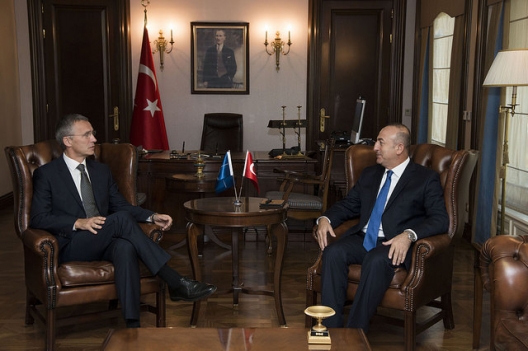 ON TUESDAY representatives of each of NATO’s 28 member states gathered at the organisation’s headquarters in Brussels, at Turkey’s behest, to address the security threats that country faces related to the Syrian civil war. Turkey says it wants its allies’ support in combating recent attacks by the jihadists of Islamic State (IS) and by Kurdish militants. Its NATO allies are happy to support its fight against IS, but the battle against the Kurds is more complicated. NATO member states were forced to attend the meeting after Turkey invoked the North Atlantic Treaty’s Article Four….
ON TUESDAY representatives of each of NATO’s 28 member states gathered at the organisation’s headquarters in Brussels, at Turkey’s behest, to address the security threats that country faces related to the Syrian civil war. Turkey says it wants its allies’ support in combating recent attacks by the jihadists of Islamic State (IS) and by Kurdish militants. Its NATO allies are happy to support its fight against IS, but the battle against the Kurds is more complicated. NATO member states were forced to attend the meeting after Turkey invoked the North Atlantic Treaty’s Article Four….
Turkey wants NATO to express support for its efforts to combat both IS and the PKK. But while NATO is pleased with Turkey’s newfound eagerness to fight IS, it is hesitant about Turkey’s aims towards the Kurds. America has a strong relationship with the Kurdish regional government in northern Iraq and an increasingly strong one with another Kurdish militia in Syria, the People’s Defence Units (YPG), which battles IS. The YPG is closely allied with the PKK.
Furthermore, many believe that Turkey’s Islamist president, Recep Tayyip Erdogan, is deliberately escalating the fight against the PKK in order to undermine popular support for Turkey’s main pro-Kurdish political party, which drew many votes from secular Turks in the last elections in June. The long-ruling Justice and Development (AK) party, which Mr Erdogan co-founded, lost its majority in those elections and has failed to form a coalition, and Mr Erdogan may be planning to call snap elections. NATO is wary of such possible political motivations behind Turkey’s fight with the Kurds.
Did Turkey get what it wanted out of the Article Four consultation?
Partly. In a statement, the NATO partners said they “strongly condemn the terrorist attacks against Turkey”, and affirmed that “the security of the Alliance is indivisible”. They placed their support for Turkey in the context of the international struggle against terrorism. America and other NATO allies consider both IS and the PKK to be terrorist organisations. But while the NATO statement specifically offers condolences to the families of the victims in Suruc, where IS staged its attack, it goes on to mention only “other attacks against police and military officers” rather than referring more clearly to the PKK’s attacks. And it does not offer support for any particular actions undertaken by Turkey in response. Invoking Article Four has reminded everyone that Turkey is a NATO ally, but if Turkey wanted NATO’s imprimatur for its war against the PKK, it does not seem to have got it.
Image: Secretary General Jens Stoltenberg and Turkish Foreign Minister Mevlut Cavusoglu, Oct. 9, 2014 (photo: NATO)
